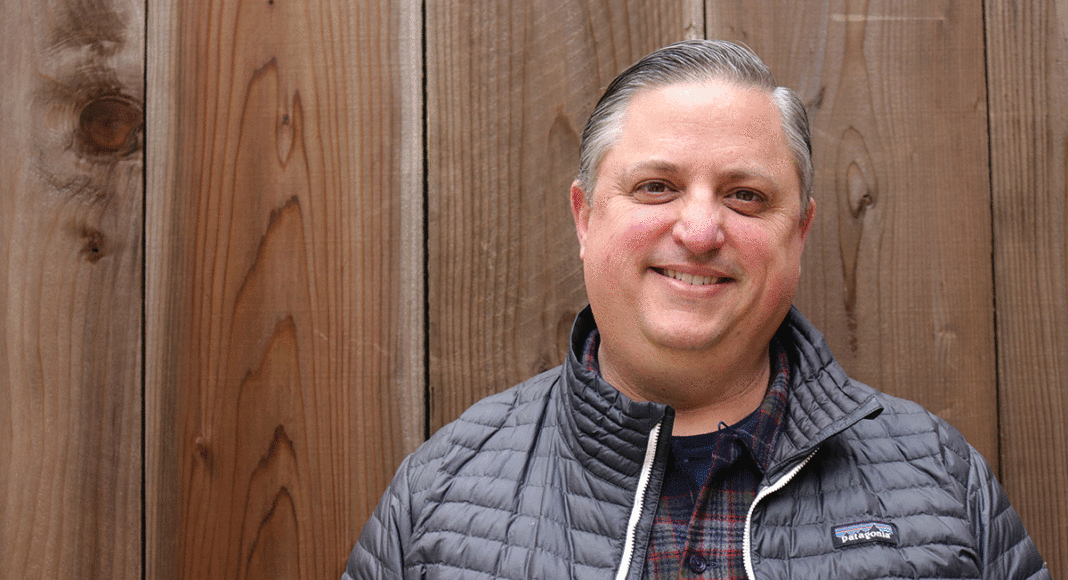Until 2016, Carson Kelly was a lot like most people he knew in Santa Cruz. He had a family, a full-time job, a life that didn’t allow much time for boredom or idleness. He thought of himself as politically engaged, if you count bookmarking FiveThirtyEight.com being “engaged.” But he was less a political activist than he was a political “passivist,” to coin a term.
That changed dramatically with the election of Donald Trump to the presidency. In short order, Kelly and his wife Shannon founded Santa Cruz Indivisible, the local chapter of an activist group inspired by the Indivisible Guide, a 26-page Google doc created by a handful of congressional staffers shortly after the election that outlined practical advice for a progressive resistance movement against Trump and the Republican Party.
Back in the days following the Trump inauguration, Kelly was upfront about his inexperience and his uncertainty in the political arena. “You go blindly into the fog swinging your sword hoping you’ll hit something,” he said at the time.
Fast-forward two years later, to the winter of 2019 and the arrival of the 116th U.S. Congress. Kelly watched in wonder as the newly elected congressional representatives were sworn in, but he felt particular satisfaction when he saw Democrat T.J. Cox walk down the aisle.
Cox was the challenger against Republican incumbent David Valadao for the seat representing California’s 21st district, which covers a vast area of the San Joaquin Valley, just to the east of the 20th district that includes the communities of the Monterey Bay. Santa Cruz Indivisible was among several progressive activist groups that sent volunteers to the neighboring 21st district to canvas door-to-door in hopes of flipping the seat from red to blue.
On election night, media outlets called the race in favor of the incumbent Valadao. But in the following weeks, the vote tally tightened, and when the last ballot was counted, Cox came out ahead by a little more than 800 votes—less than 1 percent of the total vote count.
“It was pretty amazing,” says Kelly, “We made a real difference. If Santa Cruz Indivisible had not done our work, and other groups had not done their work, it probably would not have happened the way it did.”
The outcome of the other targeted district, the 22nd, wasn’t as satisfying for Santa Cruz Indivisible. In that race, Republican incumbent Devin Nunes, who rose to national fame as the Trump-friendly chair of House Intelligence Committee, won decisively over his Democratic challenger. “We didn’t get that one,” says Kelly of the Nunes seat. “But we’ll get him in 2020.”
Seven seats flipped in California from Republican to Democrat. Nunes is now one of only seven Republicans left in California’s 53 congressional districts.
Of the wins that allowed the Democratic Party to take control of the House, Kelly says, “My opinion of it, it was not the Democratic Party that did that. It was progressive grassroots organizations who did that. In some cases, it happened despite the Democratic Party.”
Post-2018, Kelly is a passivist no longer. As a sudden local political leader, he is now reflecting on the lessons the past two years have taught him about how political change happens. When Santa Cruz Indivisible first formed, he says, the group “was just fighting, resisting the craziness that was coming from Donald Trump.” But the former UCSC philosophy student began to see broader themes that went beyond the day’s headlines. He began to understand that the group’s first order of business was to make people aware of their own power as citizens. Only then could they exercise that power in the midterm elections. Now that that power has been established in Congress, Indivisible’s next step is to effectively advocate for change.
Progressive movements, however, have always been vulnerable to factionalism and division, and Kelly has given a lot of thought to how to stay united in the face of unified opposition. “I’m trying my best as part of the core leadership to avoid an environment where schisms are going to arise.”
How is he doing that? By making distinctions between “values” and “issues,” he says. “We have to be in the business of being unified on the values front, though not necessarily on the issues front,” he says. “We’ve lost the discussion about values.”
Santa Cruz Indivisible has a mailing list of about 2,500. It engages another 1,500 people through social media. The group operates in a non-centralized manner to maximize effective action and to minimize conflict about priorities. “We don’t have a meeting every week where we expect everyone to come,” says Kelly. “We don’t require everyone to agree or believe in everything. That’s impossible anyway. So we have activities that are not dependent on each other.”
Kelly says that Indivisible will partner with other community groups, including TEDx Santa Cruz and Bookshop Santa Cruz, on an initiative called “Citizenship 2.0,” a series of events to explore the meaning of citizenship in a complex modern and technological world. At the same time, he says, SCI will seek to model effective political activism.
“People come to us motivated to do something,” he says. “We want to capture that energy. We want to allow them to do what they’re passionate about, and then get the hell out of the way—as long as they are not doing something that is harmful to someone or is going to get us in trouble. We don’t need to second-guess them. They should be able to tell us what we can do to help them. We share the same values.”













